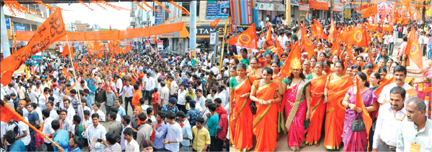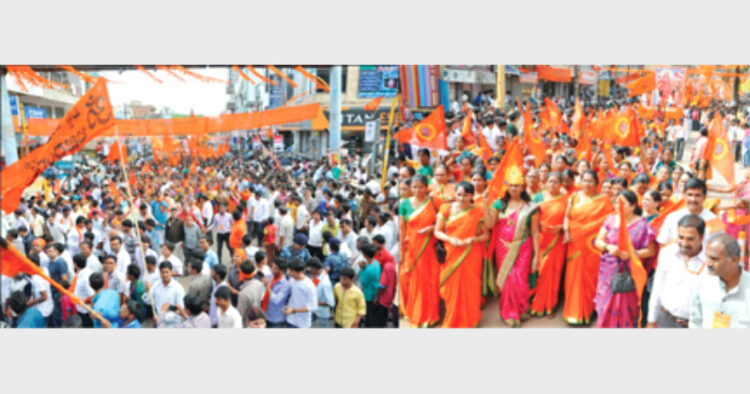
A curious shift in the approach of a couple of ‘secular’ politica parties towards Hindus as a religious group is underway. Having condemned Hindutva, and everything remotely related to it for long, they have suddenly sensed the potential of Hindu votes. The BJP’s fairly consistent electoral successes since 2014 and the repeated inability of a combined opposition to beat it in vote politics are seemingly churning up their behaviour.
The change in the strategy of the prime opposition party during the course of Gujarat election heralded this trend. A sudden splurge of interest in Hindu pujas, religious processions etc by anti-BJP parties confirms the trend.
As a topic, ‘Hindu votes’ may be unusual in mainstream political discourse but the ‘secular’ parties have pushed it upfront. Prima facie, their current strategy may not work unless they earn the trust of Hindus at the first place Their first major handicap is that they, together with most political parties, betray severe ignorance about Hindus as a group.
‘Secular’ Liberals’ Twist
The vast majority of Hindus are tolerant and secular who are the country’s vital links with the ancient Hindu civilisation.
But right since independence a class of ‘secular’ ‘liberals’ conceited intellectuals has been shaping public opinion and influencing state policies and have either misrepresented or hindered an objective understanding of the common Hindus.
A Persecuted Community
The Hindus may be considered as the most persecuted community in course of medieval and modern history. It is a tragic saga of how their few millennia old exalted civilisation that contributed so much to human progress in realms of religion, philosophy, arts, architecture, literature, science, mathematics, astronomy, medicine, etc fell victim of wanton pillage, savagery, injustice, deception and deprivation at the hands of foreign invaders and their collaborators spanning over few centuries.
Terror of Islamic Rule
Beginning with a series of brutal raids by Mahmud of Ghazni in early 11th century and continuing through the six centuries of Islamic rule, the Hindus were relentlessly persecuted in a variety of ways. Their temples in tens of thousands were destroyed, desecrated or converted into mosques. Their Holy Scriptures and many books of knowledge were torched. Their properties were pillaged. They were made to pay taxes simply to retain their religion and brutal measures employed to enforce payments. Hundreds of thousands were converted to Islam under the threat of the sword.
Dichotomous Effects
Such savagery had a dichotomous effect on Indians. Sections of Hindus who converted to Islam at varying stages of Islamic rule and came to constitute a bulk of the Muslim population in modern India escaped from the endemic persecution, while for the overwhelmingly large number of Indians who refused to give up their faith, misery and distress continued. Within the same socio-economic class in the country, Muslims enjoyed a more peaceful, secure and advantageous life vis-à-vis their Hindu brethren. Notwithstanding, Hindus, true to their inherent secular disposition bore no ill will towards the converts. Conversions
Contrary to popular perception, the Hindus continued to face persecution under the British Raj also. Religious conversion continued and bled Hindu society although that often happened under the façade of morality. Poverty and ignorance were exploited through subtle and unethical inducements. Further, a political strategy was worked out to wean away the depressed sections of Hindus from the broader Hindu society which helped large-scale conversion.
Craftily and gradually building up a case for dividing Hindus, Ramsay McDonald’s communal award in August 1932 proposing separate electorate for the depressed classes pierced the heart of Hindus as a religious group. Though the proposal per se could be averted, the mischief stuck, divided the community into two sections almost irrevocably. It continues to bleed to this day from this grave hurt.
British played an obnoxious trick in introducing a community representative for the Muslims. Having done that, they added to the mischief at the cost of political rights of Hindus. Though they constituted overwhelming majority i.e., nearly 75% of the population in undivided India, their representation was progressively curtailed.
This started through the system of separate electorate for Muslims in the Indian Councils Act 1909. Thereafter with decadal reforms through GOI Act in 1919, 1935 they faced further diminution of rights vis-à-vis Muslims.
Partitioning India
The final vengeance wreaked by the Raj on Hindus was the partition of India. It inflicted much greater suffering on Hindus, unlike the mischievous impression ‘secular’ historians belaboured to create that religious minorities in both countries were equally affected.
To start with, it needs to be reckoned that the two communities had radically different views on the issue and their perceptions of sufferings were bound to be influenced by the same. On the other hand, Jinnah led Muslim League wanted it at any cost including bloodbath. In the 1945 federal election which was a kind of referendum on Pakistan, Muslim electorate all across the country overwhelmingly supported the League and its stand. It may thus be argued that to the community in the undivided sub-continent the partition was a kind of prize won.
Hindus in Pak & Bangladesh
While during the partition minorities in both countries were persecuted, since then, the treatment of minorities in India and Pakistan has been asymmetric.The Hindu minorities have been facing endless miseries and life of great indignity in Pakistan and to a large extent even in Bangladesh. This has compelled the majority of them to move over to India as refugees. Even after seventy years since independence the lives of tens of millions of these Hindu refugee families in India have remained afflicted. A small percentage of Hindus who still remain in Pakistan (around 1% of the total population now as against about 20 per cent at the time of partition) and Bangladesh (around 9 per cent now as against 29 per cent then) live under conditions of abject humiliation.
Vote Bank Politics
Within India, the political mischief that has been making lives of Hindus increasingly intolerable while not doing any real good to their Muslim brethren has been the practice of minority appeasement. As quid pro quo for the minority votes, most political parties—national or regional, democratic or communist—have been encouraging religious bigotry and supporting a range of medieval and regressive social practices such as polygamy, triple talaq, halal, etc in Muslim community. In addition, these parties and their intellectual patrons have been overtly or covertly defending irresponsible social behaviour that hinders voluntary acceptance of birth control norms amongst this segment of Indian population.Declining in Number
Across the world, Hindus are a minority community accounting for only 15.1 per cent as against Christians 31.2 per cent and Muslims 24.1%. In an increasingly globalised world this subjects them to varieties of
difficulties especially proselytising initiatives from the other two faiths.
Whether due to global or local factors or both, Hindus have been gradually declining as a proportion to the total population of the country. Two snapshots show Hindus
suffered a steep decline from 84.1 per cent of the Indian population in 1951 to below 78.4 per cent in 2011. To make matters worse the tendencies of religious fanaticism which were witnessed in the Jinnah-led Muslim community in the pre-partition era seem to be resurrecting and adding to their disquiet.
In J&K, which is a Muslim majority state, Hindus are deprived of
minority status too. Hindus face same discrimination in 7 other states / UTs too where they are minority community. No statutory initiative has been taken till now to meet such legitimate expectations.
Need for Equitable Treatment
In spite of several centuries of
continuous persecution, the teeming billion of ordinary Hindus remain secular and liberal as ever. But they have been anguished by the
excesses of pseudo-secular politics that pose an existential threat to their civilisational identity. As a
bulwark against such a possibility they seemingly want an end to a biased policy regime in the civic sphere involving issues such as marriage, divorce, family planning, inheritance etc. They also appear to be gravely anxious about protecting the lives, properties and other rights of Hindus in states where they are in minority. These basic measures, they reckon, are critical to ensuring ‘sustainable development’ for Indians across the board. On the other hand, if the state remains in a state of denial, such apathy
portends an existential threat to the community in long run. Being basic to survival these issues probably come up higher in terms of priority to them over economic reforms.
The Right Path
The general election in 2014 showed that a collective Hindu consciousness across caste and class lines was on the emergence. It sought to defend the civilisational identity. BJP won in as many as 282 Lok Sabha seats with only 31 percent vote share. If the bulk of these voters is presumed to have belonged to the above population, the percentage was still a small portion of the total. Considering that Hindus constituted nearly 78.4% of the electorate, further mobilisation in future can bring unprecedented results and therefore look alluring in electoral terms. This prospect seems to be tempting other parties. However, this is easier said than done!
In 2014 general elections, Modi could connect to vast masses of Hindus civilisationally and win their trust that their key concerns on the uniform civil code, population policy, the abolition of Art 370 etc will be addressed. So long as this trust remains intact, the competition for votes of the religious majority will be really tough. In any case to start building a sustainable rapport with Hindus as a religious group the opposition parties need to undergo changes in comprehension and attitude.
-Dr Sudip Kar Purkayastha
(The writer is a founding editor of ‘Indian Journal of Bank Marketing’)














Comments